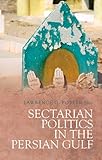Sectarian politics in the Persian Gulf
Material type: TextPublication details: London Hurst & Company 2013ISBN:
TextPublication details: London Hurst & Company 2013ISBN: - 9781849043380
- DS326 .S42 2014
 Print
Print
| Item type | Home library | Collection | Call number | Status | Date due | Barcode | |
|---|---|---|---|---|---|---|---|
 Print
Print
|
OPJGU Sonepat- Campus Main Library | General Books | 322.109536 SE- (Browse shelf(Opens below)) | Available | 011879 |
Machine generated contents note: -- 1. Understanding Sectarianism in the Persian Gulf / Justin J. Gengler -- 2. Sectarian Relations and Sunni Identity in Post-Civil War Iraq / Fanar Haddad -- 3. The State and Sectarian Identities in the Persian Gulf -- Monarchies: Bahrain, Saudi Arabia, and Kuwait in Comparative Perspective / Laurence Louër -- 4. Royal Factions, Ruling Strategies, and Sectarianism in Bahrain / Kristin Smith Diwan -- 5. Identity Politics and Nation-Building under Sultan Qaboos / Marc Valeri -- 6. Yemen: Sectarianism and the Politics of Regime Survival / Khaled Fattah -- 7. The Baluch Presence in the Persian Gulf / J.E. Peterson -- 8. Iran's Ethnic, Religious, and Tribal Minorities / Lois Beck.
"Long a taboo topic, as well as one that has alarmed outside powers, sectarian conflict in the Middle East is on the rise. The contributors to this book examine sectarian politics in the Persian Gulf, including the GCC states, Yemen, Iran and Iraq, and consider the origins and consequences of sectarianism broadly construed, as it affects ethnic, tribal and religious groups. They also present a theoretical and comparative framework for understanding sectarianism, as well as country-specific chapters based on recent research in the area. Key issues that are scrutinised include the nature of sectarianism, how identity moves from a passive to an active state, and the mechanisms that trigger conflict. The strategies of governments such as rentier economies and the 'invention' of partisan national histories that encourage or manage sectarian differences are also highlighted, as is the role of outside powers in fostering sectarian strife. The volume also seeks to clarify whether movements such as the Islamic revival or the Arab Spring obscure the continued salience of religious and ethnic cleavages"--
"Sunni-Shia relations in the GCC countries are analysed by the contributors in the wake of recent protests in Bahrain, Saudi Arabia and elsewhere"--
There are no comments on this title.

